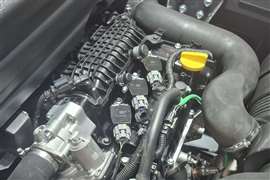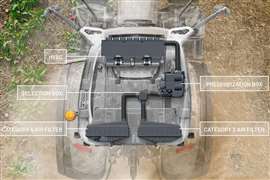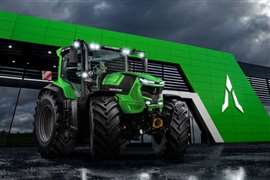Webasto supplies battery and thermal management solutions
04 November 2022
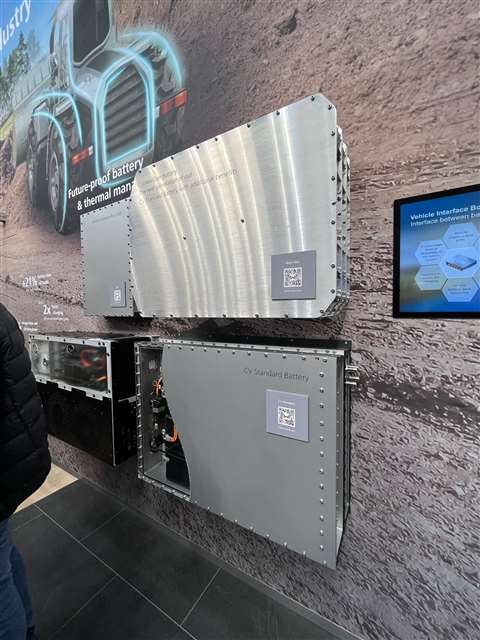 The standard battery systems can be utilized in both 400 V and 800 V systems. (Photo: Diesel Progress staff)
The standard battery systems can be utilized in both 400 V and 800 V systems. (Photo: Diesel Progress staff)
With a growing demand for electric solutions in the construction industry, Webasto showed a complete product portfolio for electrification of construction equipment and vehicles at Bauma 2022. The portfolio includes battery systems, interfaces and thermal management solutions for a broad range of electric construction and commercial vehicle applications.
The standard battery systems, which are produced at Webasto’s technology plant in Schierling, Germany, are designed to withstand challenging off-road environments. They undergo rigorous testing for robustness and are CE certified as a further sign of product quality, said Kai Faulbaum, communication manager/spokesman, Customized Solutions (Global), Webasto Group. Each battery pack has a capacity of 35 kWh and up to 18 packs can be interconnected. The batteries can be utilized in both 400 V and 800 V systems.
The Vehicle Interface Box (VIB) is the interface between the battery system and the vehicle. It combines the functions of a power distributor, master battery management system (BMS) and fuses in a robust housing, Webasto noted. The Vehicle Interface Gateway (VIG), which has been on the market since June, also offers a master BMS function but in a more compact form. It can be used to map up to nine battery packs in a 400-volt system and up to 18 battery packs in an 800-volt system, offering a total capacity of up to 630 kWh.
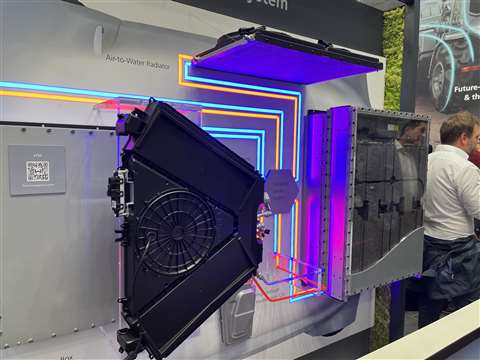 Webasto offers thermal management solutions to meet a variety of conditions and applications. Shown is the modular ETM system, which just went into serial production. (Photo: Diesel Progress staff)
Webasto offers thermal management solutions to meet a variety of conditions and applications. Shown is the modular ETM system, which just went into serial production. (Photo: Diesel Progress staff)
Webasto works closely with each customer to identify the configuration that will best meet their needs. “We do not perceive ourselves only as a hardware vendor, but also as a service provider,” Faulbaum said. “Not everybody [is out] there with a huge research department, so even if a small or midsize company wants to electrify their fleet… and doesn’t know where to start, they call us and we brainstorm, ‘What’s the purpose? How much [power] do you need?’”
Heating and cooling
The company takes a similar approach to thermal management. “Batteries have to run in an ideal temperature – around 21 to 22 degrees C to get the most power out of them and make them as long lasting as possible,” Faulbaum noted. “So, we always, of course, recommend to combine them with our thermal management.”
Webasto offers solutions to meet a variety of conditions and applications. For example, the eBTM 2.0 is a compact, standalone device for thermal management of traction batteries. With a heating capacity of 10 kW and a cooling capacity of 8 kW, it enables optimal functionality of water-cooled battery packs in electric commercial and construction vehicles, even under extremely hot or cold ambient conditions.
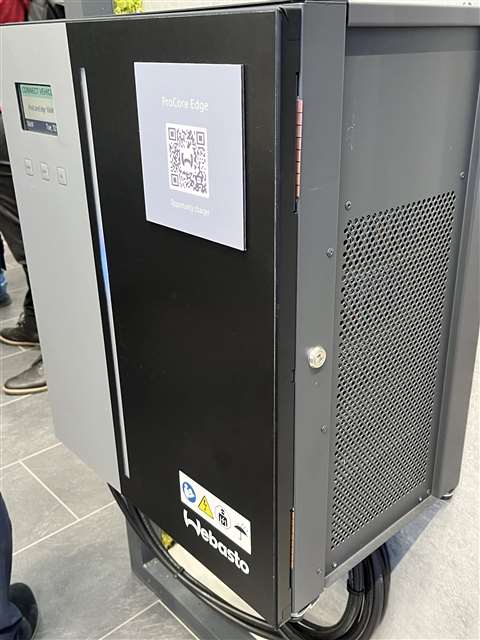 The ProCore Edge charger for traction batteries between 24 V and 96 V was developed specifically for the intralogistics sector and supports both lead-acid and lithium-ion batteries. (Photo: Diesel Progress staff)
The ProCore Edge charger for traction batteries between 24 V and 96 V was developed specifically for the intralogistics sector and supports both lead-acid and lithium-ion batteries. (Photo: Diesel Progress staff)
According to the company, the eBTM 2.0 can extend the pack’s service life (state of health) by up to 21% in hot ambient temperatures. Charging time can be halved thanks to active thermal preconditioning of the battery cell during the charging phases.
For ambient conditions that demand particularly high heating requirements, the High Voltage Heater (HVH) offers a powerful heating solution for both the cabin and batteries in hybrid and electric vehicles.
Taking charge
Also highlighted at Bauma were battery charging solutions, including the Unite smart charging station with a charging capacity of up to 22 kW. This wallbox charger is suited for both standalone and cluster mode operation. Also on hand was the bidirectional DC Wallbox, as well as the Webasto Go mobile charging solution capable of delivering up to 7.3 kW of charging capacity.
In addition, Webasto showed the ProCore Edge charger, its latest development for traction batteries between 24 V and 96 V. The ProCore Edge was developed specifically for the intralogistics sector and supports both lead-acid and lithium-ion batteries.
POWER SOURCING GUIDE
The trusted reference and buyer’s guide for 83 years
The original “desktop search engine,” guiding nearly 10,000 users in more than 90 countries it is the primary reference for specifications and details on all the components that go into engine systems.
Visit Now
STAY CONNECTED




Receive the information you need when you need it through our world-leading magazines, newsletters and daily briefings.
CONNECT WITH THE TEAM











